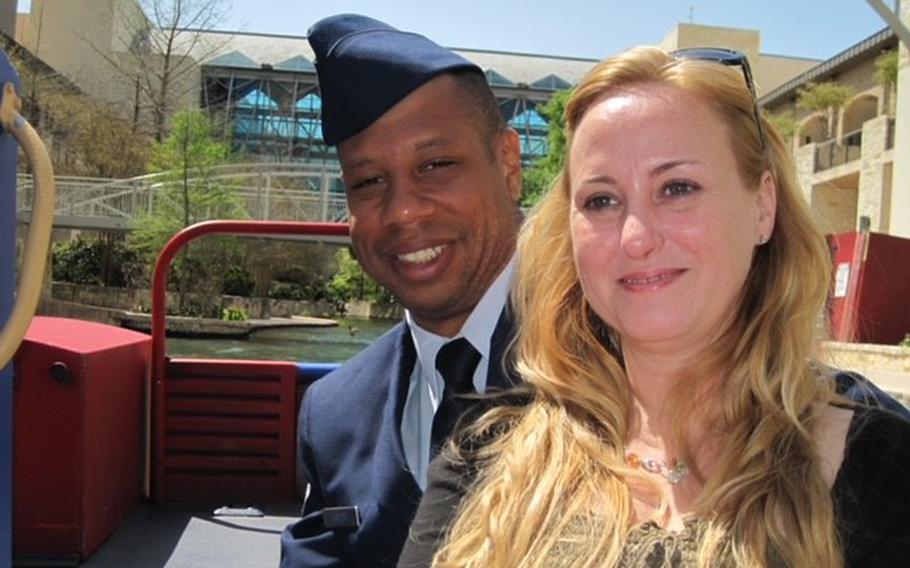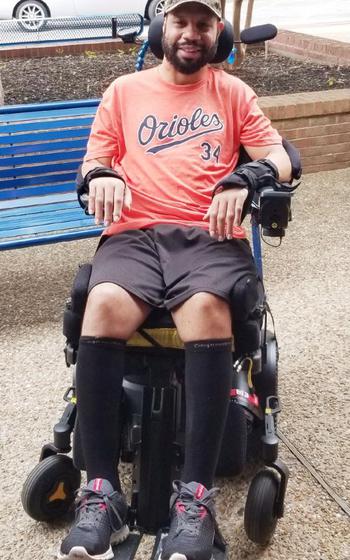
Ryan Carter, a medically retired technical sergeant from the Maryland Air National Guard, and his wife Kathleen Cole in a photo before a 2018 surgery left Carter paralyzed. Carter has petitioned the Supreme Court to hear his lawsuit, which has been denied in lower courts because of a statute that bars service members from suing the military when they are injured during medical malpractice. (Photo provided by Christopher Casciano. )
Staff Sgt. Ryan Carter walked into Walter Reed National Military Medical Center on April 6, 2018, for a common back surgery meant to alleviate chronic neck pain. He never walked again.
A former information technology airman for the Maryland Air National Guard, Carter has limited use of his left arm but is otherwise paralyzed from the chest down.
In the years since his surgery, he and his wife Kathleen Cole have fought two battles: Carter learning to live as a quadriplegic in need of round-the-clock care and suing the military hospital and surgeon for the trauma his spinal cord suffered during the operation that resulted in his paralysis.
Carter’s attorney Christopher Casciano filed a petition June 5 with the Supreme Court to revisit a ruling that it made more than 70 years ago known commonly as the Feres Doctrine which bars service members from suing the Defense Department for injuries suffered while in the military. He’s worked with Carter on six previous filings for administrative claims or civil suits that were required to get to the Supreme Court as the final stop for his case. Each was denied or dismissed.
The final dismissal came from the Fourth Circuit Court of Criminal Appeals, which heard oral arguments on the case in January. The three-judge panel cited a 1989 court decision that found Feres applies to service members on excess leave and receiving medical treatment from military doctors.
“I’m doing this because I got injured, obviously, but this is not just for me. We’re doing this for everybody else, for people that come after me,” Carter, 49, said during a call from his home in Tampa, Fla., where he and his wife moved in 2021 to be close to a Department of Veterans Affairs facility that specializes in spinal cord rehabilitation. He had previously spent time in a facility in Colorado and has never been able to return to his previous home in Baltimore.
The Feres Doctrine has been used to prevent military medical malpractice lawsuits since 1950 and has even limited the ability of people to bring military rape cases to civil courts for recourse. Congress in 2019 passed a law to allow service members to file malpractice claims through their service branch. If the service denies the claim, the service member cannot take their case to the courts.
The Federal Tort Claims Act, first established in 1946, is the means for people to take legal action against the federal government for negligence to its employees. However, the law leaves out “claims arising out of the combatant activities of the military … during time of war.”
In its Feres v. the United States decision in 1950, the Supreme Court expanded interpretation of the statute to include injuries that are “incident to service,” a broad description that has come to encompass nearly everything in military life.
Since the military began accepting medical malpractice claims in 2020, the Army has received 258 claims, the Navy and Marines have received 193, and the Air Force 134. Of those, the Army has approved 12, the Navy three and the Air Force six. They have denied 81, 103, and 71, respectively, while the rest remain pending or in appeal.
“That legislative effort to somehow deal with Feres is just absolute nonsense,” Casciano said. “None of those service members or family members have access to the courts because all the government has to do is deny their claim. They can’t appeal it. They can’t file in the circuit court, and they’re just sitting there. Those cases are just sitting there.”

Ryan Carter, a medically retired technical sergeant from the Maryland Air National Guard, was paralyzed during a 2018 surgery at Walter Reed National Military Medical Center. He has petitioned the Supreme Court to hear his lawsuit, which has been denied in lower courts because of a statute that bars service members from suing the military when they are injured in medical malpractice. (Photo provided by Christopher Casciano)
‘Our whole world has changed’
Cole, 57, said suing is “to have that acknowledgment of the fact that our whole world has changed.”
Carter had just finished a seven-month activation with the Air Force on March 13, 2018, and decided to have an orthopedic spine procedure called an anterior cervical discectomy and fusion. Carter hoped it would help with his cervical spondylotic myelopathy, a neurological condition that frequently develops in adults as the spine compresses over time. The disease caused chronic pain in his neck, and numbness and tingling in his hands.
The surgery is common in the United States and is performed on average about 132,000 times a year, according to the Cleveland Clinic, a medical research and education facility in Ohio.
Carter weighed having surgery at Johns Hopkins Hospital in Baltimore but instead chose Walter Reed in Bethesda, Md., he said because of the reputation of the military facility. Presidents go there for treatment, he said.
“There was nothing distinctively military about the surgery or the care provided to Mr. Carter,” Casciano wrote in his Supreme Court petition.
During the procedure, Carter sustained an injury to his spinal cord. When he woke up afterward, he was unable to move his arms and legs. He underwent a second emergency operation the same day and was then sent to the intensive care unit where he was intubated and sedated.
After three weeks in intensive care at Walter Reed, Carter transferred to the Hunter Holmes McGuire VA Medical Center in Richmond, Va., where he would spend the next year in rehabilitation therapy for his spinal cord injury.
About once a month, members of Carter’s unit would make the more than three-hour drive from Baltimore to visit with him. They would take Cole out for lunch and ask her how she was doing and what she needed.
During one of the visits, Guard members held a ceremony for Carter to promote him to the rank of technical sergeant. He had earned the qualifications prior to the surgery, but the moment came unexpectedly, he said.
“Oh, my goodness. It’s hard thinking of [that day],” said Carter, who intended to serve until he was eligible for retirement. “They didn’t have to do that.”
While in Richmond, Carter’s military status was changed, and Casciano said this might be the key to helping their case catch the attention of the Supreme Court. On June 27, 2018, the Air National Guard retroactively changed Carter from inactive duty to active duty, according to court documents. The orders backdated his active status to March 14, 2018.
“Mr. Carter was arguably more akin to a veteran than an active-duty service member,” Casciano said. “He was inactive, no orders, no duties, no mission, and 82 days after his injury, the government retroactively changes his military status.”
Previous court filings on the case were all dismissed before evidence gathering, the attorney said, so he can only speculate why it was done. Active duty afforded financial and medical benefits to Carter, but it also has triggered the Feres Doctrine, Casciano said.
Maj. Ben Hughes, spokesman for the Maryland Air National Guard, said Friday that Carter was on medical continuation orders, which allow for medical coverage related to military service.
“We continue to send our sincere condolences to his family and all who knew him,” he said.
Feres and the court
Carter’s petition asks the court to review two questions. Should Feres bar medical malpractice claims when the service member was not on active duty or was retroactively placed on active duty? Also, should Feres be clarified, limited or overruled?
In recent years, there often has been at least one case involving Feres among the roughly 8,000 petitions submitted to the Supreme Court for review, said Michael Wishnie, a professor at Yale Law School. Of all petitions, less than 100 are granted, and it is rare for the court to say why a petition wasn’t selected.
However, in 2021, Justice Clarence Thomas wrote a short dissent when the court denied a petition from Wishnie regarding the case of a former cadet of the U.S. Military Academy at West Point, N.Y. The cadet said she was raped at the academy and sued over inadequate prevention policies.
“At a minimum, we should take up this case to clarify the scope of the immunity we have created. Without any statutory text to serve as a guide, lower courts are understandably confused about what counts as an injury ‘incident’ to military service,” Thomas wrote.
The Supreme Court’s lack of action on the Feres Doctrine could mean the court thinks if its ruling on that statute is wrong, Congress can act and fix by passing a law, Wishnie said.
Congress’ only actions on Feres have been limited exceptions for claims related to contaminated water at Marine Corps Base Camp LeJeune, N.C., and the administrative medical malpractice claims.
“The risk is that narrow congressional amendments may confirm the justices’ view that when Congress has thought about injuries to service members recently, they have not done a wholesale rewrite to overturn Feres. They just made these technical adjustments, which, to some members of the court, may be evidence that Congress basically agrees with Feres,” Wishnie said.
But in his view, Feres is wrong.
“It is lazy of the court to leave it to Congress to fix,” Wishnie said. “If the court granted [a petition], I suspect a majority of the court would agree with Justice Thomas that Feres was wrongly decided.”
Carter and Cole said they knew their legal battle would take years and would not be easy.
Living in Tampa, the couple are isolated from the network of family and friends developed over a lifetime in Baltimore. The VA affords him home health care workers, but staff shortages in the industry means there are some days where Carter cannot get out of bed because there is no one able to help him.
With neither of them able to work, they can’t afford a van to accommodate Carter’s wheelchair. Cole can’t travel anywhere because she has no backup support to stay with her husband.
“It’s totally isolating at times,” she said.
Part of Carter’s care includes weekly mental therapy.
“When I was going through this initially, I thought about [my wife] and what she was going through,” he said. “That’s the main part of my [post-traumatic stress disorder].”
In the next month, Casciano said he’s advocating for military organizations with an interest in Feres to get involved and submit letters to the court in support for the petition. Previous Feres cases have not gotten past this petition stage, so he hopes documented support can help.
Carter and Cole said their legal efforts to hold the military accountable for his injury has not created any animosity toward the service. Rather, it’s the opposite.
“I think they are special people that join the military and are willing to basically lose their lives or sacrifice their livelihood,” Cole said.